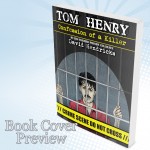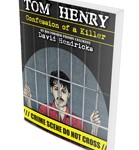 Today my niece, Paula, who blogs for True Woman, a Christian ministry, referred to my 30-year-old case in her well-written blog (in case you can’t tell, I’m proud of her). She referred to something I told her recently, that my doubting of my former faith began with a comment made to me by a member of our Christian fellowship during the wake of my wife and three children. He had said to me, “God must have some great work for you to do!”
Today my niece, Paula, who blogs for True Woman, a Christian ministry, referred to my 30-year-old case in her well-written blog (in case you can’t tell, I’m proud of her). She referred to something I told her recently, that my doubting of my former faith began with a comment made to me by a member of our Christian fellowship during the wake of my wife and three children. He had said to me, “God must have some great work for you to do!”
The following scene is from my upcoming book, Tom Henry, in which I tell, for the first time ever, of that comment and how it affected me. The setting is Tom Henry’s prison cell, into which I had just moved because we had decided to work together to write his story. Here is that scene:
“You go to chapel for something to do, or are you serious about your faith?” I asked.
“Dead serious. I got saved at a place down home called Penitentiary Bend, believe it or not. I went there to commit suicide by running my car off the road over a cliff. I was drunk at the time. But my car skidded and got stuck in the mud and I got saved. And I’ve been saved ever since.”
“Do you think it was God that got you stuck, or you being drunk?”
Tom Henry paused a thoughtful beat. “Let me put it this way. God did it, but it was one of his easiest jobs ever! Clarence from It’s a Wonderful Life could’ve arranged it.”
“Never seen it. I grew up in a house without a TV and Susie’s home growing up was the same way.”
“You didn’t have a TV?”
“No, we were a very devout church and we believed we should keep our homes free from the influences of the world. Actually, about half of us had TVs. I’d guess in a few years most will. Times change.” I remembered those good, sober, devout people. “But those folks don’t change too fast.”
“Do you still consider yourself a member?”
“No. After I was convicted of these murders, I resigned. Even then, some of them didn’t want to accept my resignation, but it was for the best. You can’t be a Biblical church and have a convicted murderer as a member!”
“What kind of church was it? I’ve heard it called a cult on the news.”
“Well, cult is a tough word to define. If it means a small religious group that’s a little bit unusual, yes. They take the Bible as the literal, inspired Word of God. They believe we’re sinners in our natural state, because of Adam and Eve’s original sin, and only the sacrifice of Jesus on the cross can satisfy a righteous God as payment for our sins.”
“That’s not unusual. My church believes that,” Tom Henry said.
“OK, then, how about this? They don’t call their buildings churches. They’re ‘meeting rooms’ or ‘assembly halls.’ And they don’t have an ordained preacher. So it’s pretty old fashioned, but not a cult. If you want a simple way to peg them, think of them as Baptists on steroids.”
“So you’re not a member, but are you still a believer?”
“That’s a good question. After being hit by this tragedy, I looked around and I noticed what appears to be blind random luck, not divine guidance, regulating human affairs. Bad luck and good luck, and you’ll never know what’s going to strike you until it does. So that’s a pretty humanistic belief. It’s certainly not faith.”
“Well, if you don’t have faith no more,” Tom Henry said, “you’re not a believer.”
“I’m still willing to get my faith back, but, to be honest, I’m angry at God—which is a stupid thing to be, I know, because by definition God is good—but it just kills me when people from my church group tell me things like, ‘God must have some great work for you to do.’
“What are they thinking? To form me to be useful for some job God had my family killed? They’re talking about children who never had a chance to grow up. They’re talking about a woman who was the sweetest, most selfless person I ever knew. And a good God had them savagely murdered so I could be prepared for some work? Are they nuts? Who would even want to work for such a God? That’s no God; that’s a beast!”
I’d uttered the last three sentences with such vehemence I was trembling.
Tom Henry sprang off his bunk. “Man, I’m sorry! I would never—I didn’t mean to get you like this!” He paused, searching for words. “You got a lot of anger in you.” He started to sit back on the edge of his bunk but before his butt hit the mattress he sprang up again. “But you can’t call God a beast!”
“I know. I got carried away. For the last year and a half I’ve had to take it and take it and take it and I’ve never had a chance to talk it out with anyone. I can’t talk to my family or Susie’s family like this. It would just kill them. Just knowing I’m losing my faith is tearing them up. So I’m really glad to have you to talk to. I hope you aren’t sorry I moved in.”
“No, Big Stuff, it’s cool. When I get to the point in my story where I tell you about how low I got before I found God, you’ll understand. But anyway, I’m glad you’re here and I’m glad to be here for you. I mean that, Bro.”
“All right. Let’s just put this down as ‘to be continued.’”
But the need to continue that conversation never arose. I’d opened my heart to Tom Henry and he’d received what I had to say, despite his obvious disagreement. A bond of understanding had been formed between two guys about as different as two guys could be.
I thank you for reading my blog. I hope you visit often.
My upcoming book, Tom Henry: Confession of a Killer, will be e-published in September.
Regards,
David Hendricks
www.authorhendricks.com


 Last night the American people elected President Obama to a second term. I watched on CNN, until I fell asleep waiting for Florida. When I awoke this morning, Florida was still undecided, but it no longer mattered.
Last night the American people elected President Obama to a second term. I watched on CNN, until I fell asleep waiting for Florida. When I awoke this morning, Florida was still undecided, but it no longer mattered.